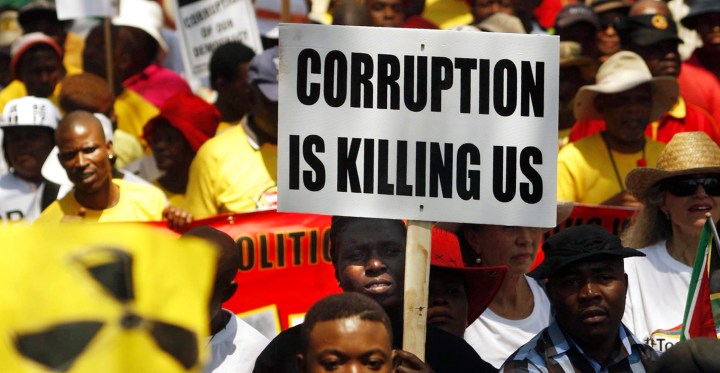POLITICS & CRIMINALITY OP-ED
SA is a critical work in progress — the national conversation on State Capture is no exception

State Capture highlights the rank criminality which positioned itself as politics and, as such, is a matter for the courts — and test the courts, it certainly will.
Seven years after the redoubtable Thuli Madonsela issued a report called State of Capture, the term “State Capture” is the established local code for the place where politics and criminality mix.
Madonsela’s report fingered the links between the country’s then president, Jacob Zuma, and an emigre family, the Guptas, and called for a judicial commission of inquiry to look into the matter. By that time, however, the relationship between the president’s family (and his inner circle) and the Guptas (and their associates) was deeply corrupted.
This was all laid bare in a 2018 book called “Shadow State”: its sub-title, “The Politics of State Capture”, which sealed the image that the South African state was near paralysed by malfeasance.
Used as a metaphor, the notion of State Capture resembles the catch-all nature of the term “Watergate” which was associated with the ending of the US presidency of Richard Nixon in 1974. Indeed, the suffix “gate” has enjoyed a fulsome — not to mention long — life in capturing political sleaze and scandal across the world, even in South Africa.
So, the suffix was used to explain this country’s mounting quandaries with crime and politics in the early days of Madonsela’s intervention when a term “Guptagate” surfaced. But it quickly faded in the face of the overall acceptance of State Capture as the default phrase to address these issues.
The currency of the metaphor was reinforced by the authority accorded to it by the “Commission into State Capture” which looked into the matter before issuing a twelve-volume report with 353 recommendations.
Read more in Daily Maverick: A library like no other: Zondo Commission records get a home
So, having taken hold, the State Capture idea continues to course through the country’s body politic.
Although the judicial commission established the facts of how state institutions were captured, there is still much that needs to be explained and understood around how (and why) these were captured. Predictably, time will reveal much more, as will the prosecution of those who have been accused of capturing the institutions and instruments of the state.
Make no mistake, State Capture highlights the rank criminality which positioned itself as politics and, as such, is a matter for the courts — and test the courts, it certainly will. To twist an insight from French political philosopher Alexis de Tocqueville (1805-1859), there is hardly any political (or criminal) question that sooner or later does not turn into a legal one.
The Watergate experience suggests that arriving at a common lexicon is the easiest part of dealing with seemingly intractable issues, like State Capture; it is often more difficult to figure out what caused it.
Another Frenchman caught the predicament South Africa faces; “Old and corrupted nations,” Napoleon Bonaparte (1769-1821) once mused, “cannot be governed on the same principles [as] young nations which are simple and virtuous.”
To fully benefit from the metaphor, State Capture must be used to examine why the “new” South Africa was predestined to turn from virtue to corruption. A good place to start is by examining three of the conditions that made its very birth possible — economic transformation, inclusion, and openness.
The first was the belief that racial harmony was possible through market-driven capitalism and trickle-down economics.
From the very get-go, this facilitated corrupt forms of business as politically connected black entrepreneurs were drawn into partnerships with established (read white) business.
Moreover, accessing wealth was possible through state coffers — a process which was facilitated by an increasingly spongy procurement policy which gave rise to the tenderpreneur phenomenon. Although intended to transform the economy, these strains of empowerment failed to address the country’s oldest social pathology, white wealth and black poverty.
A second was the absorption into the central government of people from across all the jurisdictions that had held apartheid together. These comprised the former Bantustans — where petty corruption was often a way of life — and those who had served elsewhere in the government of the old South Africa, including the degenerate security structures.
A third was the accommodation of the inflated claims of exiles and others who were appointed to positions, often way beyond their competencies. Unpoliced and unverified and sometimes stateless they — as the rise of the Guptas so dramatically demonstrated — have reached into the highest office in the land by bribery, theft and the telling of untruths.
South Africa is a work in progress; the national conversation on State Capture can be no exception. As we are working our way through it, we are discovering much about ourselves and our country, but it is in using the power of metaphor that real understanding is under way. DM
Professors Mbongiseni Buthelezi and Peter Vale are editors of the new Wits University Press publication, ‘State Capture in South Africa: How and Why it Happened’.



















 Become an Insider
Become an Insider
Comments - Please login in order to comment.